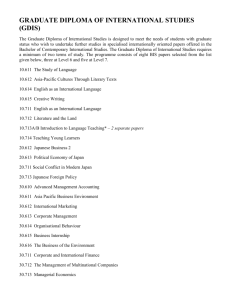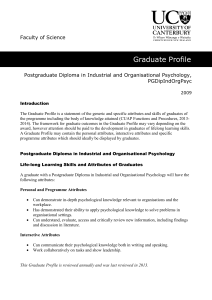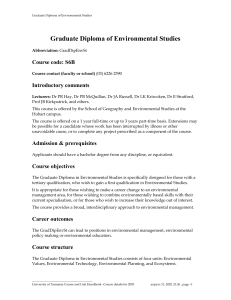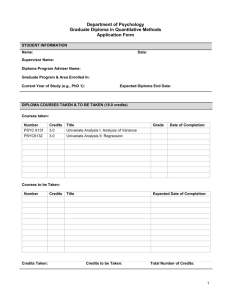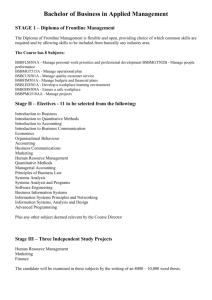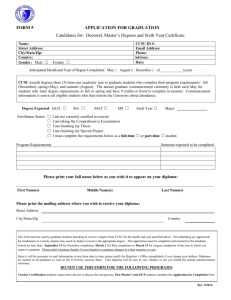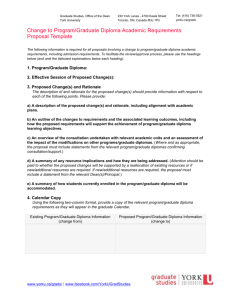Post Graduate Diploma in Management Course Structure
advertisement
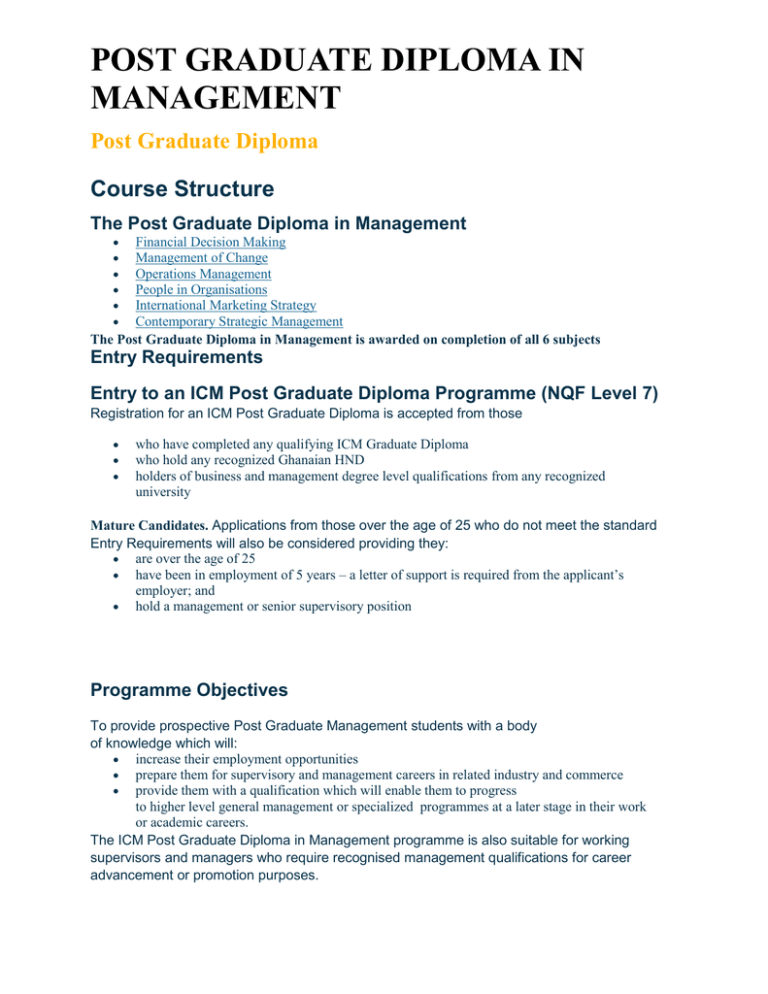
POST GRADUATE DIPLOMA IN MANAGEMENT Post Graduate Diploma Course Structure The Post Graduate Diploma in Management Financial Decision Making Management of Change Operations Management People in Organisations International Marketing Strategy Contemporary Strategic Management The Post Graduate Diploma in Management is awarded on completion of all 6 subjects Entry Requirements Entry to an ICM Post Graduate Diploma Programme (NQF Level 7) Registration for an ICM Post Graduate Diploma is accepted from those who have completed any qualifying ICM Graduate Diploma who hold any recognized Ghanaian HND holders of business and management degree level qualifications from any recognized university Mature Candidates. Applications from those over the age of 25 who do not meet the standard Entry Requirements will also be considered providing they: are over the age of 25 have been in employment of 5 years – a letter of support is required from the applicant’s employer; and hold a management or senior supervisory position Programme Objectives To provide prospective Post Graduate Management students with a body of knowledge which will: increase their employment opportunities prepare them for supervisory and management careers in related industry and commerce provide them with a qualification which will enable them to progress to higher level general management or specialized programmes at a later stage in their work or academic careers. The ICM Post Graduate Diploma in Management programme is also suitable for working supervisors and managers who require recognised management qualifications for career advancement or promotion purposes. Financial Decision Making This is not available as a Single Subject. This is a Post Graduate Diploma in Management subject. Main Topics of Study: Decision making Finance based concepts and theories related to short-term decision making, to include relevant cost evaluation, opportunity costing and pricing. Corporate objectives Finance based concepts and theories supporting the selection of long-term strategies to fulfil corporate objectives. Examples would be the Balanced Scorecard, Strategic Management Accounting, Capital Investment Appraisal and Overhead Recovery (Activity Based Costing versus traditional). Budgetary control Evaluation of the theory and practices relating to the role and effectiveness of budgetary control systems. Management of Change This is not available as a Single Subject.This is a Post Graduate Diploma in Management subject. Main Topics of Study: Concepts and theories of change Review concepts and theories in academic literature and offer a range of resolutions addressing complex change decisions in organisations. Predictable and unpredictable change, behavioural and organisational implications, environmental and organisational triggers for change. Challenges of change management Evaluation of the contributions that change management and organisational development theory make to resolve the challenges of change. Organisational structure, culture, individuals and change. Leadership and strategies of change. Research and communication Analysis of change management decisions Operations Management This is not available as a Single Subject.This is a Post Graduate Diploma in Management subject. Main Topics of Study: Operations and global competitiveness (Operations strategy, global competition, knowledge management, strategy formulation and implementation) Planning and control (Forecasting, Enterprise planning, Quality issues) Supply chain management (Definition, strategy, design, role of technology) Project management (Defining, Planning, project scheduling, control) Improvement (Critical factors, improvement, total quality management ) People in Organisations This is not available as a Single Subject. This is a Post Graduate Diploma in Management subject. Main Topics of Study: This unit takes three perspectives of analysis: the individual, the group and the organisation and breaks these down into two areas, the ‘Micro’ and the ‘Macro’. The unit starts with an analysis of the individual and the group and takes a ‘Micro’ approach to the field of OB. Here it explores areas such as personality, individual differences, employee attitudes and behaviour motivation, group formation and group decision-making. The unit is completed by analysing the ‘Macro’ or big-picture approach addresses the organisation as the primary area of analysis. Topics included are organisational structures, design, culture, climate and change management. International Marketing Strategy This is not available as a Single Subject.This is a Post Graduate Diploma in Management subject. Main Aim(s) of the Unit: The unit enables the student to build on an existing knowledge of marketing practise and develop an international understanding of the principles of marketing strategy. The unit will develop the student’s ability to critically analyse advanced strategic marketing techniques and the planning, implementation and control of these strategies. The unit requires the student to reflect on marketing theory and practices, in order to critically appraise and apply knowledge and understanding to organisational marketing decisions. Main Topics of Study: 1. 2. 3. 4. 5. 6. 7. 8. International Marketing Strategy Corporate and Marketing Objectives Market Research Strategy Tools and techniques Segmentation Strategic Positioning Market Entry Communication Learning Outcomes for the Unit At the end of this Unit, students will be able to: 1. Evaluate and apply the planning principles of international strategic marketing 2. Critically evaluate the contribution of market segmentation and market research to international marketing 3. Research, critique and evaluate marketing information to assess an organisation’s current international marketing strategy. Learning and teaching methods/strategies used to enable the achievement of learning outcomes: Students will be directed and encouraged to undertake research to enable them to critically evaluate a relevant range of theories and practices that a business could consider to support and underpin both short-term and long-term aspects related to the management of people. Each unit topic will be directed towards proposing research based practical recommendations on people related problems that could be case study, professional or work based. Assessment methods which enable student to demonstrate the learning outcomes for the Unit: Examination: 3 hours duration, based on a case study (case study to be pre-issued) Guideline for Teaching and Learning Time (10 hrs per credit) 50 hours: Lectures / Seminars / Tutorials / Workshops These interactive sessions will be used to discuss concepts and allow students to present findings 50 hours: Directed learning Advance reading and preparation / Background research / individual and group preparation for seminars 100 hours: Self managed learning Working through the course text and completing assignments as required will take up the bulk of the learning time. In addition students are expected to engage with the tutor and other students and to undertake further reading using the web and/or libraries. Contemporary Strategic Management This is not available as a Single Subject.This is a Post Graduate Diploma in Management subject. Main Topics of Study: Strategic Audit Techniques: Environmental Analysis, Resource Analysis, Portfolio analysis, Organisational Culture and Structure Strategic Issues Identification: Prioritisation, Scenario Planning, Planning and decision making Strategic Issues: Globalisation, Change Management, Organisational Learning, Information Management, Competitive Advantage, Leadership, Innovation Strategic Action: Option Generation and Evaluation, Generic Strategies, Implementation
